最新九年级英语第八单元知识点
九年级人教版英语8单元知识点及重点句型

九年级英语Unit 8短语动词小结常见短语动词结构有下面几种:1.动词+副词如:give up 放弃 turn off 关掉 stay up 熬夜这种结构有时相当于及物动词,如果其宾语是代词,就必须放在动词和副词之间,如果是名词,则既可插在动词和副词之间,也可放在短语动词后。
2. 动词+介词如:listen of 听 look at 看 belong to 属于这种结构相当于及物动词,后面跟宾语。
3. 动词+副词+介词如:come up with 提出,想出run out of 用完,耗尽 4. 动词+名词(介词) 如:take part in参加 catch hold of 抓住 1.cheer (sb.) up 使(某人)高兴、振作如:cheer me up 使我高兴 clean up 打扫 clean-up n. 打扫2. homeless adj. 无家可归的 a homeless boy 一个无家可归的男孩 home n. 家3. hand out 分发 hand out bananasgive out 分发 give out sth to sb. 分….给某人 give up doing 放弃… give up smoking 放弃吸烟give away 赠送捐赠 give away sth. to …. give away money to kid s give sb. sth. 给某人某东西 give me money 给我钱 give sth. to sb. 给某人某东西 give money to me 给我线 4. sick adj. 生病的作表语、定语ill adj. 生病的作表语,不能作定语 5. volunteer to do v. 志愿效劳、主动贡献 volunteer n. 志愿者6. come up with 提出想出 === think up 想出 catch up with 赶上追上 7. put off doing 推迟做某事 put on 穿上 (指过程) put up 张贴8. write down 写下记下9. call up 打电话 make a telephone call 打电话10. set up 成立建立The new hospital was set up in 2000. 这座医院是在2000年成立的。
九年级上册英语unit8知识点总结
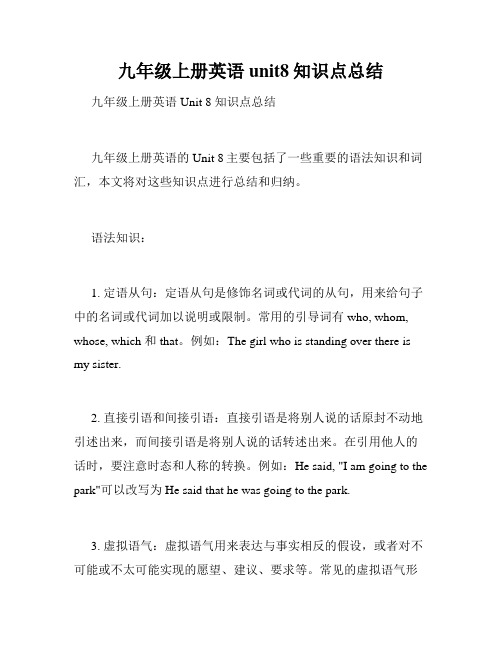
九年级上册英语unit8知识点总结九年级上册英语Unit 8 知识点总结九年级上册英语的Unit 8主要包括了一些重要的语法知识和词汇,本文将对这些知识点进行总结和归纳。
语法知识:1. 定语从句:定语从句是修饰名词或代词的从句,用来给句子中的名词或代词加以说明或限制。
常用的引导词有who, whom, whose, which 和 that。
例如:The girl who is standing over there is my sister.2. 直接引语和间接引语:直接引语是将别人说的话原封不动地引述出来,而间接引语是将别人说的话转述出来。
在引用他人的话时,要注意时态和人称的转换。
例如:He said, "I am going to the park"可以改写为He said that he was going to the park.3. 虚拟语气:虚拟语气用来表达与事实相反的假设,或者对不可能或不太可能实现的愿望、建议、要求等。
常见的虚拟语气形式有:过去时的虚拟语气、虚拟语气与“should”连用、虚拟语气中的情态动词。
例如:If I were you, I would study harder.词汇:1. 重要短语:本单元涉及了一些重要的短语,如:take part in, break up, look forward to, get along with, make friends with等。
这些短语在日常英语口语中经常被使用,在写作和口语表达中都可以灵活运用。
2. 词根词缀:英语中的词根和词缀是构成单词的重要元素,通过学习常见的词根和词缀,可以帮助我们更好地理解单词的意思,并且在词汇扩展和词义辨析上提供帮助。
3. 学科词汇:本单元的课文中涉及了一些与学科相关的词汇,如biology, physics, history等。
这些词汇对于理解学科内容和考试备考非常重要,在学习过程中需要加强记忆和巩固。
九年级上册英语第八单元笔记

九年级上册英语第八单元笔记一、单元概览本单元主要围绕“旅游”这一主题展开,介绍了不同国家的风土人情、旅游景点以及旅游相关的日常用语。
通过本单元的学习,学生可以了解世界各地的文化,提高英语交际能力,同时掌握与旅游相关的词汇和表达方式。
二、重点词汇destination: 目的地historic: 历史的,有历史意义的architecture: 建筑local: 当地的souvenir: 纪念品host: 主人schedule: 时间表,计划三、重点句型Have you been to ...? 你去过...吗?What is the capital of ...? ...的首都是哪里?How can I get to ...? 我怎么去...?What is the local specialty? 当地特色是什么?When is the best time to visit ...? 什么时候是参观...的最佳时间?四、语法重点现在完成时(Present Perfect Tense)的用法,例如:I have been to Beijing before.疑问句和陈述句的语序及构成。
五、日常交际用语Let me show you around. 我带你四处看看。
I am planning to visit ... next summer. 我计划明年夏天去...。
Can you recommend some places to visit? 你能推荐一些地方参观吗?What is the weather like in ...? ...的天气怎么样?How much does it cost to get there? 到那里要花多少钱?六、文化背景知识本单元介绍了不同国家的著名旅游景点和风土人情,包括美国的白宫、英国的大本钟、法国的埃菲尔铁塔等。
此外,还介绍了不同国家的礼仪习俗和饮食文化,帮助学生更好地了解世界各地的文化差异。
九上英语第八单元笔记
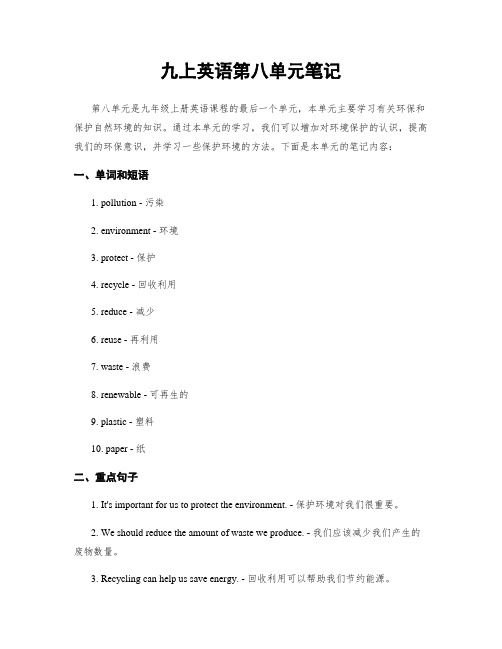
九上英语第八单元笔记第八单元是九年级上册英语课程的最后一个单元,本单元主要学习有关环保和保护自然环境的知识。
通过本单元的学习,我们可以增加对环境保护的认识,提高我们的环保意识,并学习一些保护环境的方法。
下面是本单元的笔记内容:一、单词和短语1. pollution - 污染2. environment - 环境3. protect - 保护4. recycle - 回收利用5. reduce - 减少6. reuse - 再利用7. waste - 浪费8. renewable - 可再生的9. plastic - 塑料10. paper - 纸二、重点句子1. It's important for us to protect the environment. - 保护环境对我们很重要。
2. We should reduce the amount of waste we produce. - 我们应该减少我们产生的废物数量。
3. Recycling can help us save energy. - 回收利用可以帮助我们节约能源。
4. We should reuse plastic bags instead of throwing them away. - 我们应该重复使用塑料袋,而不是扔掉它们。
5. Renewable energy sources like solar and wind power are better for the environment. - 太阳能和风能等可再生能源对环境更好。
三、重点知识1. Pollution: Pollution refers to the contamination of the environment by harmful substances or waste. It can be caused by various factors, including industrial activities, vehicle emissions, and improper waste disposal. Pollution has a negative impact on the environment, human health, and the overall ecosystem.2. Environment: The environment refers to the surroundings or conditions in which living organisms exist. It includes the natural elements such as air, water, and land, as well as the living organisms that inhabit them. Protecting the environment is essential for the sustainability of life on Earth.3. Protect: Protecting the environment involves taking measures to prevent or reduce the damage caused by human activities. This can be done through various means, such as implementing stricter regulations, promoting renewable energy sources, and raising awareness about the importance of environmental conservation.4. Recycling: Recycling is the process of converting waste materials into reusable materials. It helps to conserve natural resources, reduce energy consumption, and minimize the amount of waste that goes into landfills. Common recyclable materials include paper, plastic, glass, and metal.5. Reduce and Reuse: Reducing and reusing are important principles of waste management. By reducing the amount of waste we produce and reusing items instead of throwing them away, we can minimize the negative impact on the environment. This can be done through practices such as using reusable water bottles, shopping bags, and opting for digital media instead of printed materials.四、学以致用1. Take action: Each of us has a role to play in protecting the environment. We can start by making small changes in our daily lives, such as turning off lights when not in use, using public transportation, and separating recyclables from non-recyclables. Encourage others to do the same and raise awareness about the importance of environmental conservation.2. Get involved: Join environmental organizations or participate in community initiatives related to environmental protection. This can include volunteering for clean-up activities, tree planting, or lobbying for stricter environmental regulations. Together, we can make a difference and create a sustainable future for generations to come.总结:九上英语第八单元主要学习了环保和保护自然环境的知识。
人教版九年级英语第八单元知识点梳理

play football踢足球play basketball打篮球play baseball打棒球
【语法重点】
第八单元的语法重点是:情态动词表推测。
情态动词表推测
情态动词must,may,might,could,may,can表示推测含义与用法后面都接动词原形,都可以表示对现在情况的揣测和推断但他们含义有所不同。
Please wake me up at 8 o'clock.请在8点钟叫醒我。
11.look for:寻找,强调找的过程(重要);find:找到,强调找的结果,如
I am looking for a pen.我正在找一支笔。
I found my pen just now.我刚刚找到了我的笔。
12.hear:听到,强调听的结果;listen:听,强调听的过程,如
(1)must:一定,肯定(100%的可能性),如
The dictionary must be mine.这本词典一定是我的。
(2)may,might,could:有可能,也许(20%-80%的可能性),如The CD might/could/may belong to Tony because he likes listening to pop music.这个光盘也许属于托尼,因为他喜欢听流行乐。
6.neighbor:邻居,指人;neighborhood:街区、街坊,指附近的地区。
7.当形容词修饰something,anything,nothing,everything等不定代词时,放在这些词的后面(重要,切记),如something strange奇怪的某物。
8.escape from…:从...逃跑出来(常考短语),如
九年级unit 8知识点
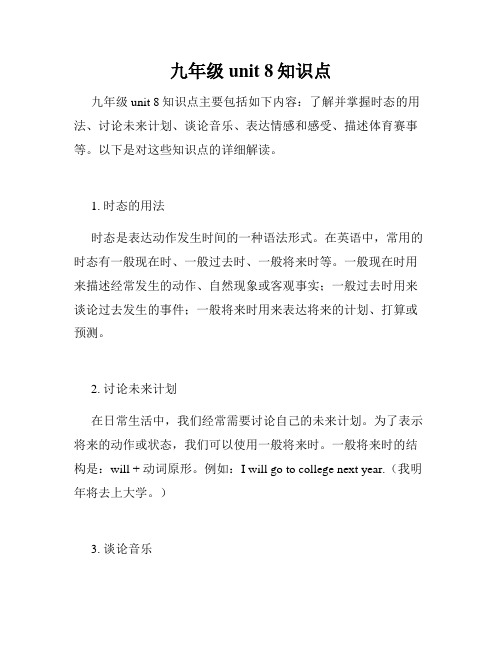
九年级unit 8知识点九年级unit 8知识点主要包括如下内容:了解并掌握时态的用法、讨论未来计划、谈论音乐、表达情感和感受、描述体育赛事等。
以下是对这些知识点的详细解读。
1. 时态的用法时态是表达动作发生时间的一种语法形式。
在英语中,常用的时态有一般现在时、一般过去时、一般将来时等。
一般现在时用来描述经常发生的动作、自然现象或客观事实;一般过去时用来谈论过去发生的事件;一般将来时用来表达将来的计划、打算或预测。
2. 讨论未来计划在日常生活中,我们经常需要讨论自己的未来计划。
为了表示将来的动作或状态,我们可以使用一般将来时。
一般将来时的结构是:will + 动词原形。
例如:I will go to college next year.(我明年将去上大学。
)3. 谈论音乐音乐是人们生活中不可或缺的一部分。
我们可以用英语进行谈论与音乐有关的话题。
例如,我们可以表达自己对某首歌曲的喜爱,或者说出自己最喜欢的音乐类型等。
4. 表达情感和感受在日常交流中,我们经常需要表达自己的情感和感受。
使用适当的形容词和副词可以更好地表达我们的情感。
例如:I feel excited about the upcoming concert.(我对即将到来的音乐会感到兴奋。
)5. 描述体育赛事体育赛事是人们热爱的活动之一。
当我们想要描述一场体育赛事时,需要用到适当的动词、形容词和副词来描绘比赛的进程和结果。
例如:The home team scored a goal in the last minute and won the game.(主队在最后一分钟打进一球,赢得了比赛。
)以上就是九年级unit 8知识点的内容。
通过学习和掌握这些知识,我们可以更好地运用英语进行时间的描述、谈论未来计划、讨论音乐、表达情感和感受、描述体育赛事等。
这些知识点对于我们提升英语口语和写作能力都非常重要,希望你能够认真学习并加以实践运用。
加油!。
九年级全一册英语第八单元笔记
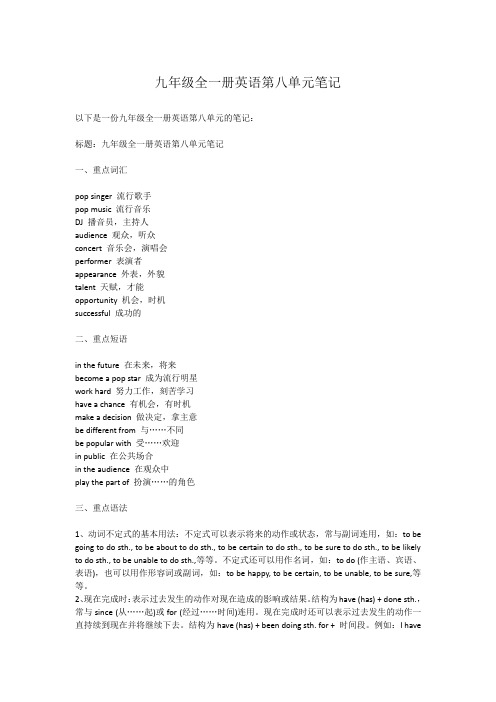
九年级全一册英语第八单元笔记以下是一份九年级全一册英语第八单元的笔记:标题:九年级全一册英语第八单元笔记一、重点词汇pop singer 流行歌手pop music 流行音乐DJ 播音员,主持人audience 观众,听众concert 音乐会,演唱会performer 表演者appearance 外表,外貌talent 天赋,才能opportunity 机会,时机successful 成功的二、重点短语in the future 在未来,将来become a pop star 成为流行明星work hard 努力工作,刻苦学习have a chance 有机会,有时机make a decision 做决定,拿主意be different from 与……不同be popular with 受……欢迎in public 在公共场合in the audience 在观众中play the part of 扮演……的角色三、重点语法1、动词不定式的基本用法:不定式可以表示将来的动作或状态,常与副词连用,如:to be going to do sth., to be about to do sth., to be certain to do sth., to be sure to do sth., to be likely to do sth., to be unable to do sth.,等等。
不定式还可以用作名词,如:to do (作主语、宾语、表语),也可以用作形容词或副词,如:to be happy, to be certain, to be unable, to be sure,等等。
2、现在完成时:表示过去发生的动作对现在造成的影响或结果。
结构为have (has) + done sth.,常与since (从……起)或for (经过……时间)连用。
现在完成时还可以表示过去发生的动作一直持续到现在并将继续下去。
新人教九年级英语unit8知识点

新人教九年级英语unit8知识点新人教九年级英语Unit 8知识点Unit 8的主题是"Adventures and Travel",通过学习这一单元,我们将了解到关于冒险和旅行的词汇、语法和交际用语。
本文将结合具体的例子和练习,帮助大家掌握这些知识点。
一、词汇在这个单元中,我们将学习一些与冒险和旅行相关的词汇。
比如,我们会学习到一些描述旅行的词汇,如"journey"(旅行)、"destination"(目的地)和"itinerary"(行程)。
同时,我们还会涉及到一些动词,如"go sightseeing"(观光)、"explore"(探索)和"hike"(徒步旅行)。
为了更好地掌握这些词汇,我们可以通过一些练习来记忆。
比如,我们可以利用词汇卡片来熟悉这些词汇的写法和发音。
我们也可以通过模拟真实场景,进行对话练习,提高词汇的运用能力。
二、语法在这个单元中,我们将学习到一些与动词的语态相关的语法知识。
比如,我们会学习到被动语态的用法和构成。
被动语态的构成通常是由"be"动词加上动词的过去分词。
例如,"The book isread by him."(这本书被他阅读)。
为了更好地理解被动语态的用法,我们可以通过练习来加强对其的掌握。
例如,我们可以进行填空练习,选择正确的动词形式来构成正确的句子。
我们还可以进行改错练习,找出句子中的错误,并进行修改。
这样可以帮助我们更好地理解和运用被动语态。
三、交际用语在这个单元中,我们还将学习一些与旅行和冒险相关的实际交际用语。
例如,我们将学习如何向他人询问旅行的经历,如"What did you do on your trip?"(你旅行时做了什么?)或者"What wasthe most memorable part of your adventure?"(你冒险中最难忘的部分是什么?)。
九年级英语第八单元重点知识总结
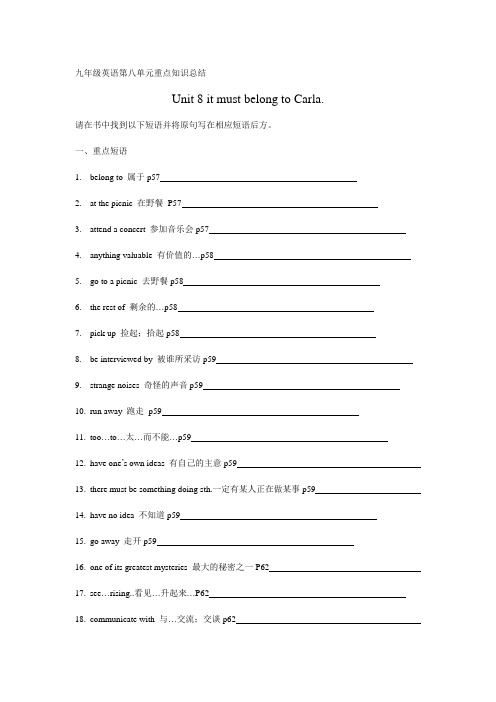
九年级英语第八单元重点知识总结Unit 8 it must belong to Carla. 请在书中找到以下短语并将原句写在相应短语后方。
一、重点短语1.belong to 属于p572.at the picnic 在野餐P573.attend a concert 参加音乐会p574.anything valuable 有价值的…p585.go to a picnic 去野餐p586.the rest of 剩余的…p587.pick up 捡起;拾起p588.be interviewed by 被谁所采访p599.strange noises 奇怪的声音p5910.run away 跑走p5911.too…to…太…而不能…p5912.have one’s own ideas 有自己的主意p5913.there must be something doing sth.一定有某人正在做某事p5914.have no idea 不知道p5915.go away 走开p5916.one of its greatest mysteries 最大的秘密之一P6217.see…rising..看见…升起来…P62municate with 与…交流;交谈p6219.point out 指出P6220.put together 放在一起p6221.in a certain way 用一种特定的方式P6222.on midsummer’s morning 在仲夏的早晨p6223.prevent…from doing sth. 阻止做某事P6224.be used for 用来做…p6225.burial place 墓地p6226.honor ancestor 纪念祖先p6227.a long period of time 很长一段实践p6228.a group of 一群…p6229.stop…from doing sth. 阻止做某事p6330.wait for 等待p6431.a bit late 晚一点p6432.on the phone 通过电话p6433.at work 在工作p64。
新人教版九年级英语unit8知识点归纳

新人教版九年级英语unit8知识点归纳新人教版九年级英语Unit 8知识点归纳在新人教版九年级英语教材的Unit 8中,我们学习了许多有关网络与社交媒体的知识,这些知识对于我们现代社会的学习、工作与交流起着重要的作用。
在本篇文章中,我们将对Unit 8中的一些重要知识点进行归纳总结,为大家巩固学习提供帮助。
第一部分:网络和社交媒体的介绍在Unit 8的第一部分,我们了解到了网络和社交媒体对我们的生活产生了巨大的影响。
我们可以通过互联网搜索信息,使用社交媒体平台与朋友分享生活、交流想法。
社交媒体的开展为我们提供了许多便利,但同时也需要我们提高信息的安全意识,避免上当受骗。
第二部分:信息的价值和安全性在这一部分,我们学习了信息的价值以及如何保证信息的安全性。
我们应该正确评估信息的真实性和可靠性,避免被虚假信息所误导。
同时,我们还学习了一些保护个人信息的方法,如设置复杂的密码、不随意分享个人信息等。
第三部分:网络对人际关系的影响网络的兴起对人际关系产生了深远的影响。
我们可以通过社交媒体与朋友、家人保持联系,拓展社交圈子。
然而,过度沉迷网络也会使我们与现实世界的人际交往减少。
因此,我们要学会合理利用网络,保持平衡的生活方式。
第四部分:网络安全问题及解决方法在网络上,我们也会面临一些安全问题,如网络欺诈、网络侵犯等。
我们应该学会辨别垃圾信息,不随意下载和点击可疑链接。
同时,我们还需要保护好自己的个人信息,避免泄露给不明身份的人。
第五部分:虚拟社交和现实社交的比较在这一部分中,我们探讨了虚拟社交和现实社交两种不同形式的人际交往。
虚拟社交使我们能够与更多人联系,但同时也带来了面对面交流的减少。
我们应该在虚拟社交和现实社交之间寻找平衡,发展健康的人际关系。
第六部分:如何利用社交媒体提升自己在这一部分中,我们学习了如何利用社交媒体平台提升自己。
我们可以通过发布优秀的作品、分享知识与经验来展示自己的才艺与能力。
同时,我们还要注意自我管理,避免沉迷于社交媒体而忽视其他重要的事务。
九年级英语第八单元知识点
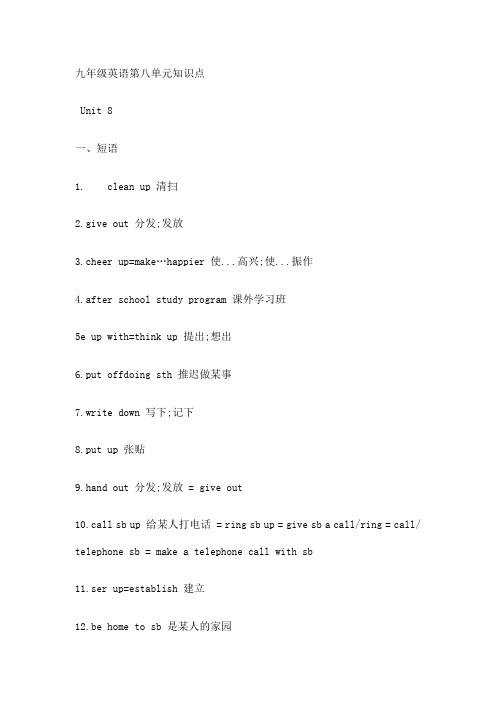
九年级英语第八单元知识点Unit 8一、短语1. clean up 清扫2.give out 分发;发放3.cheer up=make…happier 使...高兴;使...振作4.after school study program 课外学习班5e up with=think up 提出;想出6.put offdoing sth 推迟做某事7.write down 写下;记下8.put up 张贴9.hand out 分发;发放 = give out10.call sb up 给某人打电话 = ring sb up = give sb a call/ring = call/ telephone sb = make a telephone call with sb11.ser up=establish 建立12.be home to sb 是某人的家园13.volunteer one’s time to do sth 自愿花时间干...14.put…to use… 把...投入使用 15.elementary school 小学16.plan to do sth 计划干...打算干= plan on doing sth17.coach a football team for kids 训练少年足球队18.start a Chinese History club 开办一个中国史俱乐部19.run out of 用完;耗尽20.take after 在性格或长相方面与父母相象21.fix up 修理22.give away 捐赠23.be similar to 与...相似24.ask for 索要ask sb for sth 向某人要某物25.a call-in center for parents 家长热线26.hang out 闲荡27.put up signs asking for singing jobs 张贴寻求唱歌工作的广告28.run out of money for singing lessons 学唱歌的钱用完了29.disabled people 残疾人30.for sure 确实如此;毫无疑问31.fill…with... 用...填充...be filled with = be full of 被装满了...32.help...out 帮助...做事;解决难题摆脱困境33.a specially trained dog 一只经过特殊训练的狗34.train sb to do sth 训练某人干... 35.fetch my book 去把我的书拿来36.part of speech 词性二、重点知识1.You could give out food at a food bank. P60你可以在食品供应站分发食品..give out在这里是“分发”;“散发”的意思..Our English teacher gave out the examination papers when the bell rang.我们的英语老师在铃响的时候分发试卷..◎另外一个意思为“用完”;“消耗尽”..After a week their food supplies gave out. 一周之后;他们的食物供应用完了..◎还有一个意思为“发出”;“送出”..The sun gives out a lot of heat. 太阳能发出热量..2.He looks sad. Let’s cheer him up.P61他看上去很伤心..我们去帮他振作起来吧..cheer up sb或cheer sb up意为“使某人高兴起来;振作起来”..如果是代词做宾语;则将代词放在中间..Cheer up The news isn’t too bad. 不要发愁啦;这消息不错嘛He took her to the ballet to cheer her up.他为了使她高兴起来;便带她去看芭蕾舞..3.This volunteer work takes each of them several hours a week; so it is a major commitment. P62这份义工每周花了他们每个人好几个小时的时间;所以这是一个重大的贡献..1each of them是指“他们中的每一个”..如果做主语;则谓语动词用第三人称单数形式..知识拓展each与every的用法◎each指一个整体中的每一个;强调个体;every着重于全体的总和;强调整体..试比较:Each has a different book. 强调各有不同..Here every child at the age of six can go to school. 侧重整体;无一例外..◎each可作形容词及代词;而every只能作形容词;但可与-one;-body;-thing等构成复合代词..◎each用在代词或复数名词前要用介词of连接;如each of them; each of the boys; every不能直接跟of连接;如不可以说every of them;而要说every one of them或each of them..◎every还可以表示“每隔”;后接基数词加名词;如every four weeks; every three months等;此种结构中的every不能用each代替..She had a rest every fives minutes. 她每隔5分钟就休息一会儿..魔力纠错①街道两旁有许多商店..误:There are many shops on every side of the street.正:There are many shops on each side of the street.魔力解析each可以用来指两个或两个以上的人或物;但是every却总是指三个或三个以上的人或物;不能指两者..4.Not only do I feel good about helping other people; but I get to spend time doing what I love to do. P62我不仅对帮助别人感到很满足;而且我还渐渐地花时间做自己喜爱做的事情..1not only ... but also also可省略是“不但……而且……”的意思;当置于句首时;not only后面从句的主谓要倒装;但but also后面的主谓不用倒装..Not only has he been to Canada; but also he knows some Canadians.他不仅去过加拿大;而且还认识许多加拿大人..Not only did he teach at school; but also he wrote novels.他不仅在学校里教书;而且还写小说..Not only…but also… 接两主语时;谓语动词随后面的主语人称和数的变化也就是就近原则如:①Not only Lily but also you like cat. 不仅莉莉而且你也喜欢猫..②Not only you but also Lily likes cat. 不仅你而且莉莉喜欢猫..常见的就近原则的结构有:Neither… nor…即不…也不… 两者都不Neither you nor I like him. 我和你都不喜欢他..Either… or… 不是…就是… 两者中的一个hand in“面交”;“上交”..The students are handing their papers in.学生们在交试卷..10. The strategies that he came up with worked out fine. P64他想到的那些办法获得了成功..1这是一个由that引导的定语从句;先行词是前面的strategies..动词短语worked out在这里作主语the strategies的谓语;意为“产生结果;发展为;结果是……”;后面不可接宾语;主语也不用“人”来充当..I wonder how their ideas worked out in practice.我很想知道他们的想法在实践中取得了什么结果..We didn’t plan it like that but it worked out very well.我们原不是那样计划的;但结果却很好..知识拓展work out的其它用法It was the best solution that he was able to work out at this time. 这是他这时能想出的最好的解决办法了..想出I can’t work out the meaning of this poem. 我理解不了这首诗的意思..理解Have you worked out this math problem 你已经算出这道数学问题了吗算出短语链语◎work on意为“从事”..Professor Green is working on a new book. 格林教授正在写一本新书.. He is working on a maths problem. 他正在算一道数学难题..◎work on后面无宾语时;表示继续工作..It’s very late; but they were still working on.时间很晚了;但他们仍然在继续工作..2fine在这里是副词;可与well替换;意思是“好;顺利”..The machine works fine. 这台机器运行很好..Sam is doing fine in his new business.萨姆在他的新业务中一切进展顺利..11.Who has filled my life with pleasure. P66……使我生活充满快乐的人..1本句中的fill...with...表示一个动作;意为“用……装满……”;其主语通常是人..He filled the bag with books. 他在书包里装满了书..Please fill the bottle with milk. 请将瓶子装满牛奶..知识拓展be filled with表示一个状态;意为“装满了……”;相当于be full of;其主语通常是人或物..The room was filled with smoke. 房间里浓烟弥漫..Her eyes were filled with tears. 她眼睛里充满了泪水..2pleasure意为“高兴;快乐”;是不可数名词;表示“乐趣;高兴的事”时是可数名词..Reading gives me great pleasure. 读书给了我很多快乐..It is one of my greatest pleasures. 它是我最大乐趣之一..◎在口语中It’s pleasure. 是回答感谢的客套语..—Thank you for your help. 感谢你的帮助..—It’s a pleasure. 不用谢..特别提示◎pleased是形容词;意为“自己感到高兴的;欣喜的;满意的”;指以任何方式表现出来或未表现出来的满足与快乐;在句中常用作表语;其主语为人..The two friends were very pleased to see each other again.这两个朋友非常高兴再次见面..I was pleased that the manager had decided not to be angry with me. 使我高兴的是经理已经不再生我的气了..◎pleasant也是形容词;表示“使人感到愉快/满意”;一般用作定语;如主语是物;也可以用作表语..It’s pleasant weather today. 今天的天气令人愉快..It’s very pleasant to sit down after standing for hours.站了几小时后坐下来很舒服..◎please是动词;表示“使高兴;满意;愉快”..Does the cloth please you 这布料合你的意吗12. Because I can’t use my arms or legs well; normal things like answering the telephone; opening and shutting doors; or carrying things have always been difficult for me. P66因为我不能灵活地使用我的手和脚;像接电话、开关门、拿东西这样的事情对于我来说都很难.. 1本句中的shut意为“关”;在许多情况下可以与close互换;只是后者语气较弱;如close the door关门也可能指半开半闭;shut the door关门指把门关紧..That shop shuts at eight pm. 那家商店八点钟关门..He closed his speech with a funny joke. 他用一个有趣的笑话结束了演说..◎当表示“关闭公路;铁路或交通工具”或作“结束”讲时;只用close.. They have closed the road for thick fog. 由于大雾;那条公路被关闭..特别提示turn off用来表示“关闭”有开关的东西;如收音机、电视、煤气、水龙头等..Please turn off the light when you leave the lab.在你离开实验室前关掉灯..Make sure the gas is turned off before you go to bed.确保上床前把煤气关掉..2本句中的carry意为“搬运;携带”;不表示带到什么地方;而携带的方式可以是提、扛、背、抱、抬等..She carried a baby in her arms. 她怀里抱了一个孩子..He was carrying a wooden box on his shoulder.他扛着一个木箱..特别提示在后面“Lucky Fetch my book.”一句中出现的fetch相当于go and bring back;意为“取来;接来”;表示一往一返..Let’s fetch some water. 咱们去打点水来..People had to walk many kilometers in order to fetch wood.为了取木料;人们不得不走许多公里路..。
九年级全册英语unit8知识点
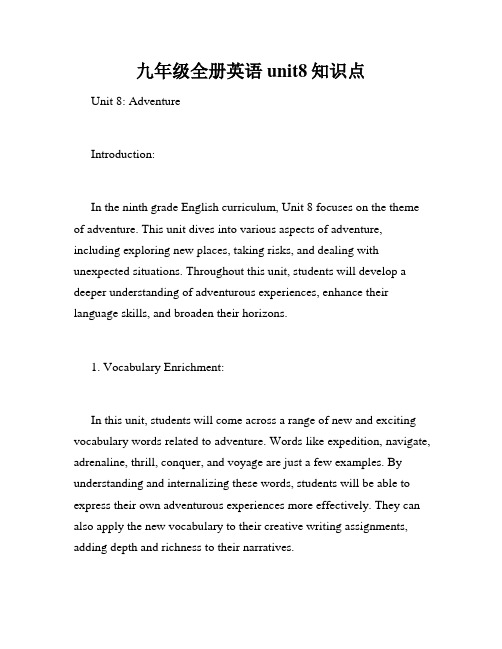
九年级全册英语unit8知识点Unit 8: AdventureIntroduction:In the ninth grade English curriculum, Unit 8 focuses on the theme of adventure. This unit dives into various aspects of adventure, including exploring new places, taking risks, and dealing with unexpected situations. Throughout this unit, students will develop a deeper understanding of adventurous experiences, enhance their language skills, and broaden their horizons.1. Vocabulary Enrichment:In this unit, students will come across a range of new and exciting vocabulary words related to adventure. Words like expedition, navigate, adrenaline, thrill, conquer, and voyage are just a few examples. By understanding and internalizing these words, students will be able to express their own adventurous experiences more effectively. They can also apply the new vocabulary to their creative writing assignments, adding depth and richness to their narratives.2. Grammar Focus:Grammar plays a crucial role in mastering any language, and the English language is no exception. In Unit 8, students will focus on using the gerund form, present simple passive, and future time clauses. These grammatical structures provide students with the tools they need to express experiences, describe actions, and discuss future plans related to adventures.3. Reading Comprehension:The unit provides students with engaging texts that explore different aspects of adventure. From thrilling accounts of mountain climbing expeditions to inspiring stories of people overcoming challenges, students will be exposed to a range of narratives. By reading and analyzing these texts, students can improve their reading comprehension skills and strengthen their ability to extract key information. Additionally, these stories can ignite their imagination and inspire them to seek out their own adventures in life.4. Speaking and Listening Activities:Unit 8 offers numerous opportunities for students to practice and refine their speaking and listening skills. Through group discussions, role plays, and presentations, students can express their opinions, share personal experiences, and engage in debates related to adventure. These activities not only enhance language fluency but also encourage students to think critically and develop their communication skills.5. Writing Tasks:Writing plays an essential role in language learning, and Unit 8 includes various writing tasks to challenge students' creativity and critical thinking. Students will be prompted to write personal narratives about their own adventurous experiences or compose persuasive essays advocating for a specific adventure activity. This gives students the chance to showcase their writing skills while also reflecting on their perception of adventure.Conclusion:Unit 8 of the ninth-grade English curriculum provides students with a comprehensive exploration of the theme of adventure. From vocabulary enrichment to grammar practice, from reading comprehension to speaking and listening activities, and from writingtasks to personal reflections, students will go on a journey of learning and self-discovery. By engaging with the materials and actively participating in class activities, students can cultivate a deep appreciation for adventure and equip themselves with valuable language skills.。
新人教版九年级英语unit8知识点

新人教版九年级英语unit8知识点新人教版九年级英语Unit 8 知识点梳理Unit 8是新人教版九年级英语教材的一单元,本单元主要围绕着“Could you please tell me where the restrooms are?”这个话题展开。
在这个单元里,我们将学习有关指路的表达,掌握一些常用的地理方位和位置介词的用法。
同时,我们也将学习一些表达请求的礼貌用语。
第一部分:指路当我们需要问路或者指引他人时,非常方便且重要的是懂得一些相关的表达和词汇。
在这一部分,我们将学习如何询问和回答指路的常用表达。
首先,我们来看一下如何问路。
1. Excuse me, do you know where the nearest bank is?(请问,你知道最近的银行在哪里吗?)在这个例句中,我们使用了礼貌的口语表达,而且用到了反意疑问句的形式,传达出一种委婉的请求。
2. Could you please tell me how to get to the museum?(请问,你能告诉我怎么去博物馆吗?)这个句子中,我们使用了礼貌用语“Could you please”,表达了一种请求的姿态。
接下来,我们来看一下如何回答指路。
1. Sure! Take the first left and then go straight. You'll see the bank on your right.(当然!第一个路口向左拐,然后一直直走。
你会在右边看到银行。
)在这个回答中,我们使用了明确的指示词,帮助对方找到目的地。
2. I'm sorry, I'm not sure. You can ask someone else.(抱歉,我不确定。
你可以问别人。
)如果你不熟悉或者不知道对方想去的地方,礼貌地向对方解释自己不知道,并提供其他解决方案。
第二部分:地理方位和位置介词在指路时,了解地理方位和位置介词也是非常重要的。
九年级英语上册第八单元知识点
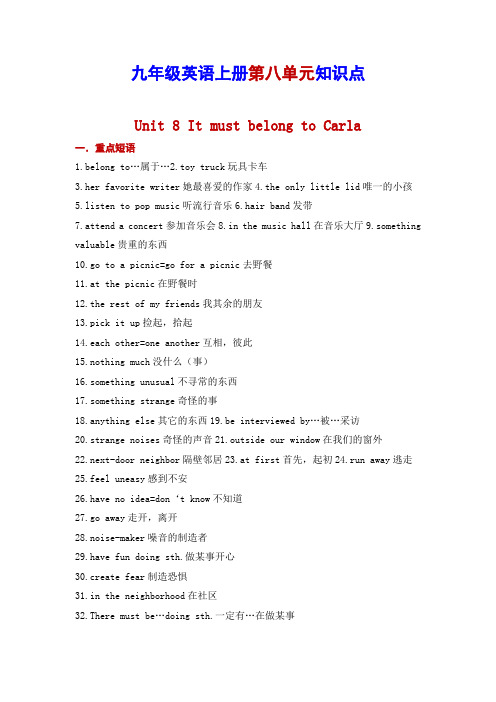
九年级英语上册第八单元知识点Unit 8 It must belong to Carla一.重点短语1.belong to…属于…2.toy truck玩具卡车3.her favorite writer她最喜爱的作家4.the only little lid唯一的小孩5.listen to pop music听流行音乐6.hair band发带7.attend a concert参加音乐会8.in the music hall在音乐大厅9.something valuable贵重的东西10.go to a picnic=go for a picnic去野餐11.at the picnic在野餐时12.the rest of my friends我其余的朋友13.pick it up捡起,拾起14.each other=one another互相,彼此15.nothing much没什么(事)16.something unusual不寻常的东西17.something strange奇怪的事18.anything else其它的东西19.be interviewed by…被…采访20.strange noises奇怪的声音21.outside our window在我们的窗外22.next-door neighbor隔壁邻居23.at first首先,起初24.run away逃走25.feel uneasy感到不安26.have no idea=don‘t know不知道27.go away走开,离开28.noise-maker噪音的制造者29.have fun doing sth.做某事开心30.create fear制造恐惧31.in the neighborhood在社区32.There must be…doing sth.一定有…在做某事33.in the laboratory在实验室34.hear water running听见流水声35.cough a lot咳得厉害36.run after追赶37.a woman with a camera一位拿相机的妇女38.at work在工作39.might be late for work可能上40.must be dreaming一定在做梦41.run for exercise跑步锻炼42.run to do sth.跑着去做某事43.catch a bus赶公共汽车44.make a movie拍电影45.wear a suit穿西服/套装46.express a difference/result表达差异/结果47.add information添加信息48.at the same time同时49.a rock circle一个石头圈50.not only…but also…不仅…而且…51.Britain's most famous historical places英国最著名的的历史名胜52.receive more than 10 visitors接待10多名游客53.on the longest day of the year在一年中最长的那天54.ancient leaders古代领导者55.a group of…一群…56..a bit late有点晚儿municate with the gods与上帝交流58 so many centuries ago许多世纪前59.point out指出60.a kind of calendar一种日历61.put together放在一起62.in a certain way以某种方式63.on midsummer‘s morning在仲夏的上午44.shine directly into…直接照进…65.the center of the stones石头的中心66.a medical purpose一个医学目的67.prevent illness阻止疾病68.move up上升,提升69.from your feet move up your body从你的脚上升到你的身体70.the position of……的位置71.for a special purpose为了一个特别的目的72.a burial place一个墓地73.a place to honor ancestors祭拜祖先的地方74.celebrate a victory over an enemy庆祝战胜敌人75.a long period of time很长一段时间二.句型用法1.must,may,might,could,may,can't+动词原形表示推测,程度不同must一定,肯定(100%的可能性)may,might,could有可能,也许(20%-80%的可能性)can‘t不可能,不会(可能性几乎为零)例:The dictionary must be mine.It has my name on it.The CD might/could/may belong to Tony,because he likes listening to pop music.The hair band can‘t be Bob‘s.After all,he is boy!2.take place常指―(某事)按计划进行或按计划发生‖(二者都无被动)happen 常指具体事件的发生,特别指那些偶然或未能预见的―发生‖例:Great changes have taken place in China since.New things are happening all around us.take place还有―举行‖之意。
九年级第八单元英语知识点

九年级第八单元英语知识点本单元的英语知识点包括了语法、词汇和阅读理解。
在下面的文章中,我将详细介绍这些知识点,帮助你更好地理解和掌握。
语法部分:1. 直接引语和间接引语的转换直接引语是直接引述别人的话,使用引号括起来。
间接引语是转述别人的话,不使用引号。
例句:Direct speech(直接引语):Tom said, "I love playing football."Indirect speech(间接引语):Tom said that he loved playing football.2. 定语从句定语从句用于修饰某个名词,并使用关系词(如who, which, that)引导。
例句:The book that I borrowed from the library is very interesting.词汇部分:1. 动词短语动词短语是由一个动词和一个或多个副词、介词短语组成的短语。
例句:Wake up(醒来)、get up(起床)等。
2. 同义词和反义词同义词是指意思相同或相近的词语,反义词则恰好相反。
例句:Synonyms(同义词):big(大)-large(大)Antonyms(反义词):hot(热)-cold(冷)阅读理解部分:1. 阅读理解技巧阅读理解要注重理解文章的主旨、细节和推理等内容,同时注意记忆一些重要的关键词。
例句:Read the passage carefully and answer the questions.2. 理解不熟悉单词的技巧在阅读理解过程中,遇到不熟悉的单词可以根据上下文进行猜测词义,或者通过查字典等工具进行解释。
例句:I don't know the meaning of this word, so I will look it up in the dictionary.通过以上的介绍,相信你对九年级第八单元的英语知识点有了更深入的了解。
九年级英语unit8复习知识点

九年级英语unit8复习知识点Unit 8 is one of the most important units in ninth-grade English. It covers various grammar structures and vocabulary necessary for effective communication. In this article, we will review the key points of Unit 8 without delving into politics or irrelevant information. Let's dive right in!Firstly, let's focus on the use of the present perfect tense. This tense is commonly used to indicate actions that started in the past and still have an impact on the present. For example, "I have studied English for nine years." Here, the speaker started studying English in the past and is still studying it now.Next, let's move on to the usage of the passive voice. The passive voice is used when the subject of the sentence is being acted upon rather than performing the action. For instance, "The book was written by a famous author." In this sentence, the book is the subject receiving the action of being written by someone else.Moreover, we should also pay attention to the formation and usage of informal and formal letters. Informal letters are usually written to friends or family members and have a more casual tone. On the otherhand, formal letters are written for business or official purposes and require a more respectful and professional tone.Furthermore, Unit 8 also introduces us to the concept of reported speech. Reported speech is used when we want to retell or report what someone else said. It requires changes in tense, pronouns, and other aspects to accurately reflect the original speaker's words. For example, "She said, 'I will go to the party tonight.'" becomes "She said that she would go to the party that night."Additionally, vocabulary plays a crucial role in language learning. Unit 8 introduces a range of useful vocabulary words related to various topics such as education, social issues, and technology. It is essential to understand and use this vocabulary in different contexts to become proficient in English.In addition to grammar and vocabulary, Unit 8 also focuses on reading comprehension. Practice reading different texts, such as articles, advertisements, and short stories, to improve both reading speed and comprehension skills. Pay attention to details, identify key ideas, and practice summarizing the main points of a text.Lastly, let's not forget about listening and speaking skills. Listening to authentic English materials, such as podcasts, songs, and movies, can help improve comprehension and pronunciation. Engaging in conversations with native or fluent speakers will enhance our speaking skills and boost confidence.In conclusion, Unit 8 of ninth-grade English covers various grammar structures, vocabulary words, reading comprehension, and listening and speaking skills. By reviewing and practicing these key points, we can improve our overall language proficiency. Remember to utilize different resources, such as textbooks, online materials, and language exchange partners, to reinforce what you have learned. With consistent effort and dedication, mastering the content of Unit 8 will undoubtedly lead to success in English language learning.。
九年级英语8单元知识点

九年级英语8单元知识点Unit 8: TechnologyIn the eighth unit of our ninth-grade English course, we will delve into the topic of technology. This unit will provide you with essential knowledge and skills related to modern advancements in technology and their impact on our lives. Let's explore the key points covered in this unit.1. Vocabulary and Phrases:- Familiarize yourself with common technology-related words and phrases, such as "smartphone," "social media," "digital" and "wireless."- Learn synonyms and antonyms for technology-related terms to enhance your vocabulary.2. Reading Comprehension:- Improve your reading skills by practicing comprehension exercises on technology-related passages and articles.- Enhance your ability to understand main ideas, supporting details, and infer information in context.3. Grammar:- Use the present perfect tense to talk about technology advancements and their effects on society.- Practice using adverbs of frequency to describe how often you use certain technologies.- Study different tenses to discuss the history and future of technology.4. Speaking and Listening:- Engage in conversations about technology-related topics, such as the benefits and drawbacks of social media or the impact of smartphones on daily life.- Practice giving opinions, asking for clarification, and expressing agreement or disagreement during discussions.- Improve your listening skills by listening to audio clips or watching videos on technology-related subjects.5. Writing:- Write formal and informal emails, messages, or letters, discussing technological inventions, advancements, or their impact on society.- Compose persuasive essays on topics like the importance of balancing screen time or the role of technology in education.- Learn to summarize and paraphrase technology-related information from different sources.6. Cultural Awareness:- Gain insights into how technology has shaped different cultures around the globe.- Explore the role of technology in communication, entertainment, and education from a cultural perspective.- Compare and contrast technological practices and beliefs in different countries.7. Critical Thinking:- Analyze and evaluate information related to technology, separating reliable sources from unreliable ones.- Formulate and support arguments about the advantages and disadvantages of specific technologies.- Reflect on the ethical dilemmas associated with technological advancements.8. Test and Exam Preparation:- Review key concepts and vocabulary covered in this unit using study guides and practice tests.- Familiarize yourself with the format and requirements of the unit exam to maximize your performance.Unit 8 of the ninth-grade English course provides a comprehensive understanding of technology and its impact on our lives. By engaging with and mastering the knowledge and skills taught in this unit, you will be equipped to navigate the ever-changing world of technology with confidence and critical thinking abilities.。
新目标九年级英语unit8知识点汇总
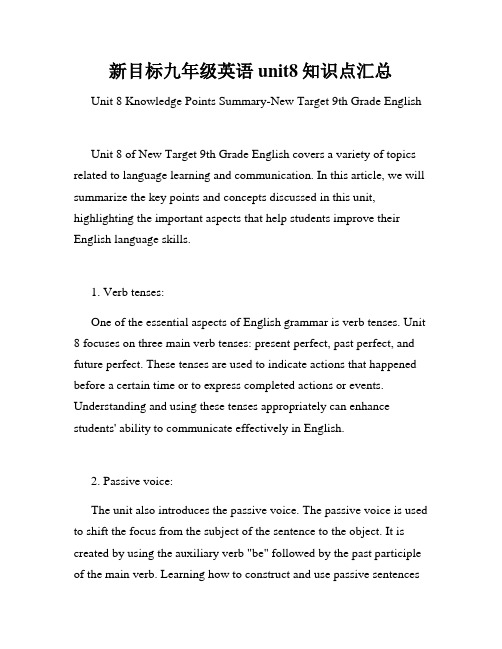
新目标九年级英语unit8知识点汇总Unit 8 Knowledge Points Summary-New Target 9th Grade EnglishUnit 8 of New Target 9th Grade English covers a variety of topics related to language learning and communication. In this article, we will summarize the key points and concepts discussed in this unit, highlighting the important aspects that help students improve their English language skills.1. Verb tenses:One of the essential aspects of English grammar is verb tenses. Unit 8 focuses on three main verb tenses: present perfect, past perfect, and future perfect. These tenses are used to indicate actions that happened before a certain time or to express completed actions or events. Understanding and using these tenses appropriately can enhance students' ability to communicate effectively in English.2. Passive voice:The unit also introduces the passive voice. The passive voice is used to shift the focus from the subject of the sentence to the object. It is created by using the auxiliary verb "be" followed by the past participle of the main verb. Learning how to construct and use passive sentencescan help create more varied and sophisticated written and spoken English.3. Reported speech:Reported speech, also known as indirect speech, is another crucial concept covered in this unit. It refers to the act of reporting what someone else said without using their exact words. When reporting speech, certain grammatical changes occur, such as changes in verb tenses, pronouns, and time and place expressions. Mastery of reported speech enables learners to accurately convey information and statements made by others.4. Comparison of adjectives and adverbs:Unit 8 delves into the comparison of adjectives and adverbs. Adjectives and adverbs can take different forms to indicate degrees of comparison such as comparative and superlative. Properly using these forms is important when describing things and making comparisons. Students will learn how to form and use comparative and superlative degrees correctly.5. Vocabulary expansion:This unit also provides an opportunity for expanding vocabulary. It introduces various topics and themes through reading texts, which contain a range of new words and phrases. Students are encouraged to engage with the texts and use context clues to infer the meanings of unfamiliar vocabulary. The acquisition of new words and phrases is crucial for developing language proficiency and communication skills.6. Listening and speaking skills:Listening and speaking skills are emphasized in Unit 8. Students get ample opportunities to practice their listening and speaking skills through various activities. These activities encourage students to listen for specific information, engage in discussions, and present their opinions. This fosters confidence in spoken English and promotes effective communication in real-life situations.7. Reading comprehension:The unit includes reading texts that cover a wide range of topics, including culture, science, and current events. Students are tasked with reading and understanding these texts, as well as answering questions and summarizing key information. Developing strong reading comprehension skills is crucial for overall language development and academic success.8. Writing skills:Unit 8 enhances students' writing skills, focusing on different types of writing, such as descriptive, narrative, and persuasive writing. Students are encouraged to express their thoughts and ideas in a structured and coherent manner. They learn to organize their writing, use appropriate vocabulary and grammar, and develop clear and concise arguments. Effective writing is an essential skill that allows individuals to communicate their ideas effectively.In conclusion, Unit 8 of New Target 9th Grade English covers a wide range of language skills, from grammar and vocabulary to listening, speaking, reading, and writing. By understanding and practicing these knowledge points, students can improve their overall English language proficiency, enabling them to communicate confidently and effectively in various situations.。
- 1、下载文档前请自行甄别文档内容的完整性,平台不提供额外的编辑、内容补充、找答案等附加服务。
- 2、"仅部分预览"的文档,不可在线预览部分如存在完整性等问题,可反馈申请退款(可完整预览的文档不适用该条件!)。
- 3、如文档侵犯您的权益,请联系客服反馈,我们会尽快为您处理(人工客服工作时间:9:00-18:30)。
最新九年级英语第八单元知识点一. 重要词汇1. clean up “打扫,清理”,是“动词+ 副词”类短语动词It’s your turn to clean up the kitchen .( 这类短语动词接名词作宾语时,名词可以放在短语的后面,也可以放在短语的中间.但如果接代词作宾语,则只能放在短语的中间)We need to clean up the classroom every day ,now it’s your turn to clean it up .2. give out === hand out “散发,分发”Give the food out to the children .Father Christmas (圣诞老人)gave out gifts to the children .3.in hospital (生病)住院in the hospital 在医院里His mother works as a doctor in the hospital .Her brother was ill in hospital .类似的有:at table 在吃饭at the table 坐在桌子旁go to school 去上学go to the school 到学校去4. put off 推迟,拖延We have to put off the sports meeting because of the rain .Don’t put off till tomorrow what you can do today .put off doing sth 推迟做某事My little brother usually puts off doing homework .put away 把……收起来放好The boy put the food away in the cupboard after he finished his dinner . put on 穿上,戴上He put his coat on .put out 熄灭,扑灭,关(灯)Please put out the light before you go to bed .put up 举起,搭建,张贴If you have any questions ,please put up your hands .They put up a tent .Don’t put up a notice here .5. cheer up ( 某人自己) 高兴起来,振作起来;使某人高兴起来,振作起来He cheered up at once when I promised to help him .We have to work harder at cheering up the patients .6.set up == found == establish 建立,成立,搭起When Edison was only ten ,he set up a small lab of his own .They set up a tent near the stream .He needs money to set up a special school for the blind .7. be home to 成为…的家园,是(某人的)家He was born in London ,but now Paris is home to him .Beijing is home to Mr Green since he came to China .8. volunteer one’s time to do sth 自愿献出某人的时间做某事He volunteers his summer holiday to look after the old man every year .9. Put sth to good use == make good use of sth 充分利用某物Workers are all glad to put the new machine to good use .As students in Grade 9 ,we should put our time to good use .== As students in Grade 9 ,we should make good use of our time .10. not only…but (also )不但…而且…;not only位于句首时,主语和谓语要倒装.Not only does he like English but also math .Not only is television boring ,but it also wastes a lot of time .(1) 位于句首的not only 连接两个并列主语时,不用倒装句;但谓语动词在人称和数量上要与最靠近的主语相一致.Not only you but also he is wrong .(2) not only…but (also )连接的成分要对等,即名词对名词,动词对动词,介词短语对介词短语.Shakespeare was not only a writer ,but also an actor .(3) not only…but (also )和as well as 都可表达“不仅……而且……”之意,但not only…but (also )强调后者,as well as强调前者.He likes not only music but also sports .=== He likes sports as well as music .She is not only pretty but also smart .=== She is smart as well as pretty .not…but …不是……而是……It’s not water but oil (油).They don’t want your pity(伶悯)but your help .11.get to do sth逐步做某事The boy gets to know that he is wrong .12. coach (1)及物动词,“训练,指导,辅导”I coach people for English exams .She’ll be coaching all summer .(2)不及物动词,“当教练”He coaches at a boy s’boarding (寄宿) school .(3)名词,“四轮大马车,长途公共汽车,教练”The football coach was criticized(批评) by the local paper .This is an old state-coach (公共马车) .13. take after (在外貌、性格等方面)与(父母等)相似== look like === be similar toHe takes after his father .14. fix up (1) 修理mend ,repair ,fix 的区别:(1)mend 一般指修补衣服、鞋袜或只需一人修理的钟表、自行车、电视机等.My mother is mending my skirt .(2)repair 指修理构造较为复杂、损伤较大的机器、汽车、建筑物等,需要的人多.They are repairing the house .(3)fix 主要表示“安装,固定”,“修理”只是其中一个意思.He has had his radio fixed up.这三个词表示修理小物品如钟表、自行车、电视机等时,可以通用.15.similar 形容词,“相似的,类似的,相象的”We have similar taste in music .I saw something similar in yesterday’s newspaper .be similar to 和……相近\ 类似My problems are very similar to yours .Paul is very similar in appearance to his brother .My opinions on the matter are similar to Jane’s .be the same as 和……相同\ 一样The pen is the same as that one .be different from 和……不同My clothes are different from his .16. give away 赠送常用give away … to…You can give it away to the charity .Give the money away to the children .17. work out (1) 结果良好,有效Most of the things he has suggested have worked out .I guess it works out all right .(2) 计算出,解答出(答案,数量等)You can work out the answer by adding all the numbers .The math problem is so difficult that few students can work it out .18. hang out 闲逛He often hangs out on the street after school .19. send sb. to somewhere 把某人送到某地In the end ,she sent his son to a boy’s boarding school .send sth to sb. == send sb sth 把某物寄给某人He sent a letter to me yesterday .=== He sent me a letter yesterday .send away 开除she is so lazy that she is sent away .send for 派人去请His mother is ill,so he sends for a doctor at once .send up 发射So far,many man-made satellites have been sent up into space .20. an organization set up to help disabled people .为了帮助残障人士而建立的机构set up to help disabled people 为过去分词短语做定语,修饰名词organization(1 ) Do you know the boy named jack ?(2 ) ------ What are on show in the museum ?------ some photos ___D_____ by the children of Yushu,Qinghai .A. have been takenB. were takenC. are takenD. taken(3 ) ------ what are they talking about ?------ A book ___C____ by Mo Yan .A. is writtenB. was writtenC. writtenD. writes还有现在分词短语做定语:(1) He also put up some signs asking for old bikes .(2)----- Who is that boy ?--- - Which boy ?-----The one ________ near the window .A. is sittingB. was sittingC. sittingD. sits21. fill … with …用……把……装满He filled the cup with tea .be filled with === be full of 被装满,充满着……The cup was filled with tea . ==== The cup was full of tea .I’m full of self-confidence . ==== I’m filled with self-confidence . 22.make it possible for sb. to do sth 使某人有可能做某事Your help makes it possible for him to pass the exam .23. help sb. out 帮助某人解决困难It was kind of him to help me out .Please help him out .24. take ,bring ,fetch ,carry 的区别:(1)take 意为“带走,拿走”,指从说话的地方将人或物带到别的地方please take these things to your sister .(2)bring “带来”,指把人或物从别的地方带到说话的地方could you bring your photos to school tomorrow ?(3)fetch “去拿,去取”,指离开说话的地方去拿到某物再回来There’s little salt here . could you go to fetch some ?(4) carry 不含任何方向的意思,侧重与用手或身体的某个部位“携带、搬运”She can carry the heavy box .25. support (1) 动词,“支撑,支持,供养”I was supported by my parents when I was studying .He needs a high (收入) to support such a large family .Her father supported her until she got married .Which football team do you support ?(2) 名词,“支持,支援”We need your support .Jim was a great support to us when my father died .26. donate 动词,捐赠We donated some money to the sick boy last month .Look ! she is donating some clothes to the old people’s home .donation 名词,捐赠的款物These students can continue going to school because of your donation . 27.in silence 默默地,无声地She sat there in silence .He is listening to his father in silence .28. keep one’s promise 遵守诺言I had to keep my promise . Sindy had all her hair cut off .29. be pleased with sb. \ sth ===be satisfied with 对……感到满意My father is pleased with me .Mr Zhang is pleased with her performance (表现).30. stop \ keep \ prevent sb from doing sth 阻止某人做某事Who can stop the dog from the classroom ?Nothing can stop me from achieving my dreams .31. be glad to do sth. 很高兴做某事I’m very glad to meet you .They are glad to be students of Mr Zhang .二.感叹句表示说话时较为强烈的感情,如喜悦、赞叹、惊异、愤怒、厌恶等.1. what 引导的感叹句what + ( a \ an ) + 形容词+ 名词+ ( 主语+ 谓语) !(1) what + a \ an + 形容词+ 单数名词( + 主语+ 谓语) !What a good boy ( he is ) !What an interesting book ( it is )!(2) what + 形容词+ 复数名词( + 主语+ 谓语) !What beautiful flowers ( these are )!What big rooms ( they are )!(3) what + 形容词+ 不可数名词( + 主语+ 谓语) !What good news ( it is ) !What fine weather ( it is )!在这种感叹句中,主语和谓语通常会省略.2. how 引导的感叹句How + 形容词\ 副词+ 主语+ 谓语!(1)how + 形容词+ 主语+ 谓语!How clever you are !How beautiful she is !How strong they are !-------人称代词做主语,be 动词做谓语.(2) how + 形容词+ 主语+ 谓语!How beautiful the girl is !How tall the buildings are !How delicious the food is !-------the + 名词做主语,be 动词做谓语.(3 ) how + 副词+ 主语+ 谓语!How fast he runs !How fast the train is moving !How hard his father works !--------- 行为动词做谓语(2) how + 主语+ 谓语!How it blows !How time flies !How I miss you !3. what 引导的感叹句可以和“How + 形容词+ 主语+ 谓语!”转换.也就是 1 what 引导的感叹句中的例子可以转换为:How good the boy is !How interesting the book is !How beautiful the flowers are !How big the rooms are !How good the news is !How fine the weather is !----------- the + 名词做主语,be 动词做谓语.练习一、单项选择1.Remember to ________ the lights before you leave the lab.A. turn onB. turn offC. turn upD. turn down2. We have to _______ the picnic because of the rain .A. put onB. put downC. put upD. put off3. This is your jacket . You’d better __________ .A. put it onB. put on itC. put up itD. put down it5. I’ve _______ petrol (汽油),so I have to stop .A. run outB. running out ofC. running outD. run out of 6.Could you tell me something about Hong Kong ? I’m ________ going there for a holiday soon .A. looking upB. thinking aboutC. trying outD. finding out7. After years of hard work ,his dream _________ in the end .8. Don’t ________ your coat ,tom ! It’s easy to catch a cold in spring .A. take awayB. take offC. take downD. take out9. It’s getting warmer and warmer . The flowers start to ________ .10. The little girl ________ her friend’s mother when I came in .A. takes afterB. took afterC. is taking afterD. was looking after11. These strategies ________ very fine .A. kept outB. go outC. worked outD. worked in12. The room is ________ smoke . I can’t see .A. filled withB. filled ofC. full withD. fulled of13. Sally has many friends . My brother is ___________ .A. a friend of herB. a friend of hersC. a friend of sheD. her a friend14. I can’t work out this problem . Who can help me _________ ?A. ofB. onC. inD. out15. Hi,jack . my schoolbag is on the bed in my bedroom .Could you __________ it for me ?A. takeB. bringC. fetchD. carry16. I don’t like the green apples . Please give me some red _________ .A. oneB. itC. onesD. they二、改写同义句1.He’s run out of his money .He’s ___________ __________ his money .2. Jack takes after his father .Jack ___________ __________ __________ his father .3. He was repairing a TV set at that time .He was _________ _________ a TV set at that time .4. How did you solve the problem ?How did you __________ ________ the problem ?5. Please give out the sweets to your friends .Please _____ _________ the sweets to your friends .6. Let’s make her happy .Let’s __________ her ___________ .7. The shop is filled with people .The shop _____ __________ __________ people .8. I’ll send you a photo of my family .I’ll ________ a photo of my family _______ you .三、用所给单词的适当形式填空1. Maybe you could help ________ ( coach ) a basketball team .2. Oh,daddy ! We can’t put off _______ ( picnic ) .3. “Lucky”is a specially ________ ( train) dog ,it’s amazing .4. ________ ( be ) unable to move about is really a challenge .5. I’d like to spend a couple of days _________ ( stay ) with you .6. Yao Ming is a __________ ( profession ) basketball player .7. Jenny wrote to her parents a letter ________ ( ask ) for 200 more dollars .8. Your parents’support is greatly ___________ ( appreciate ) .9. I feel very lucky _______________ ( have ) a dog .10. The good news made us ___________ ( happy ) ,we all cheered .四、作文学校在本周末将组织一次志愿者活动,具体活动内容如下:1.Clean up the public library ;2.Teach in a village school ;3. Visit old people’s house ;4. Take care of homeless animals at Animal Helpers .请你以Lisa的名义给校方写一封80词左右的信,申请参加志愿者活动,并说明理由.Dear Sir or Madam ,I’m a student in Class 6 Grade 9. I want to volunteer my time this weekend .Yours,Lisa。
